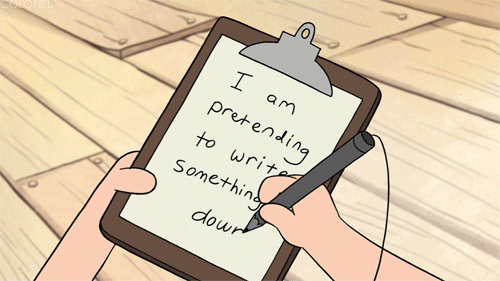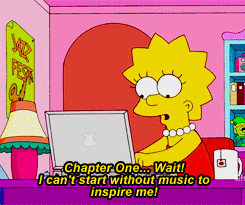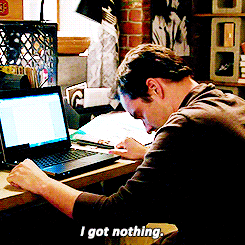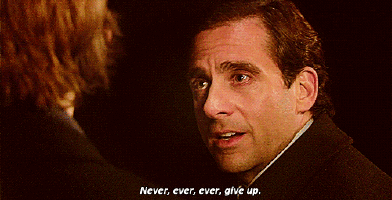For new and experienced writers alike, writing may sometimes be a challenge. Whether you're starting off new and can't think of anything to write, or if you're an experienced writer that has a bad case of writer's block, there are things that can help you continue your work. It's true that writing can be frustrating for a number of reasons; if you don't know what to start writing, if you've begun writing but have experienced writer's block, or even if you think you have no time to write even though you want to. There are many strategies out there to help you get your creative ideas flowing again. Here's a list of some of those strategies.
1. You don't always have to be wholly creative.
Many times people who write may think that whatever has to be the most original thing ever, that you have to write something that no one has ever thought of or like ever. This isn't true. While plagiarizing is obviously not good and can get you in a lot of trouble, it isn't wrong to use someone else's base idea as inspiration. You can see ideas in other books, movies, shows, music, or anything, and put your own creative twist on it. Take the concept of zombies for example. There isn't much of a difference in the way a zombie virus spreads in books or movies. However, you can come up with your own creative idea of how it spreads even though other people have said it is a disease. Maybe in your book it's some kind of mind control. Zombies are the base concept, don't think you have to think of something completely knew every time you write something. Take certain concepts and see what your brain can come up with to take it in a new direction. Continuing with the zombie theme, maybe you tell it from different perspectives, maybe your perspective is that of someone who is slowly turning zombie, there are dozens of ways to take something and make it your own.
2. Keep Writing.
Even if it isn't something you want to continue, keep writing. Any idea that pops into your head write down, who knows maybe you can use it for a future work. This will also keep track of what you've thought of already. This way, your mind won't keep backtracking to what it has already thought of. And if you don't use what you've written down, that's not a problem either - at least you're still writing. Maybe what you write isn't even coherent, it's better to be doing something than nothing. You can write about a squirrel you saw outside, or something you thought was a little odd that you saw today. Anything you can write about can help you sift through ideas and maybe come up with new ones. You may even write something absentmindedly that gives you an amazing idea.
3. Help yourself focus.
When writing something new or if you're continuing to write a work in progress, you need to focus. Don't listen to the people who say you need to go to a quiet place to write. Everyone's mind works differently. If you focus better with background noise, then go to a bookstore or a park. If you focus better in silence go to a library or stay in your room. If you like music in the background then grab your headphones and play your favorite song. Do anything* that helps YOU focus, no matter what it is if it puts you in the mindset where you can focus on what you're doing, do that.
*Disclaimer: Anything does not include bringing harm to others.
4. You have the time.
If you think you don't have time to write, you're wrong. It doesn't matter if you have class, sports, or work - you make time to write. I know what it's like to feel like you don't have time; I'm a full time student with a part time job, but I still find time to write. Go to class five minutes early, while you're sitting there, write stuff down before it starts. If you're working, you can write on public transportation or on your lunch break. Even when you get home for the night, spend ten minutes before bed writing. It doesn't have to be a lot of time, small chunks add up.
5. Be prepared.
Always carry a notebook, it doesn't matter how big, and a pen with you. You never know when you'll come up with a great idea. Don't think you'll always remember your ideas.
6. Expand your point of view.
You should love writing but if you can't come up with an idea for something you want to write, try something different. Maybe your point of view is on a romance novel. However, you simply can't continue it, try changing your point of view to something else, maybe poetry or a short story. It can help to change the perspective you're coming from.
7. READ!
I can't stress this enough. If you write you should read. Reading can give you inspiration. It is also important to develop your own writing style. Reading can show you different writing styles, any of which you may choose to make your own. Every style is different, and any one can work for you.
8. Music helps.
You may not know this but listening to music can help you be more creative. Having music on in the background can help your mind work faster and be more creative. This can help with starting a work, or writer's block.
9. Take a break.
Sometimes the writer's block is too strong. I know I said before that no matter what to keep writing, but there is one exception. It isn't good to make yourself crazy trying to write something that isn't coming to you. It isn't your fault, it doesn't mean you're a bad writer, it certainly doesn't mean it will never come to you. It isn't healthy to obsess over something like this. Sometimes you just need to take a break, let your mind rest from wracking itself. Go do something, Get some fresh air. Come back later when your mind is clear, this can help a lot.
10. Persevere.
The best tip I can probably give you is to never give up. Writing, while ridiculously fun and rewarding, can be pretty horrible sometimes. You can't give up. It doesn't matter if you've been trying for days with no success, that idea or breakthrough will come to you.

























